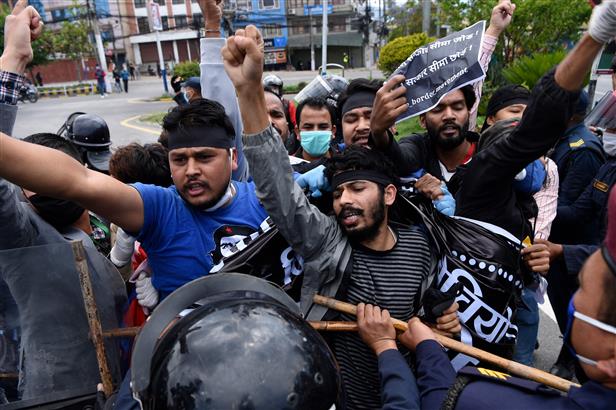Nepal objects to Kailash Mansarovar road
Date:- 10 May 2020

ouths protest Indias move, in Kathmandu on Saturday. AFP
Claims sovereignty over crucial route passing through Lipulekh Pass
A controversy has arisen in Nepal after Defence Minister Rajnath Singh announced that India had completed a road that would provide a smooth ride for pilgrims headed to Kailash Mansarovar.
The Lipulekh Pass is a strip of land in northwestern Nepal, lodged between Nepal, India and China
While India and China consider it a trijunction with Nepal, Kathmandu lays claim to the southern part of the pass and refuses to recognise it as a trijunction
Two other sectors — Kalapani and Limpiyadhura — are also part of a similar controversy that has been underplayed by both Nepal and India
Reacting to the development, Nepal Foreign Ministry has expressed “regret” and maintained that all territories east to the Kali river, including the Lipulekh Pass, where India has constructed the road, “belongs to Nepal”.
“This unilateral act runs against the understanding reached between the two Prime Ministers that a solution to boundary issues will be sought through negotiations,” it said in a statement.
The problem is that both India and China consider Lipulekh a trijunction, whereas Nepal claims it has sovereignty over the territory. Two other sectors — Kalapani and Limpiyadhura — are also involved in a similar controversy that has been underplayed by both Nepal and India.
The Border Roads Organisation (BRO) had completed work on the Ghatiabgarh-Lipulekh road on April 17, so that instead of a three-day trek to the pass, it will now be a two-day drive from Delhi. The inauguration via videoconferencing of the blacktopping on the road was done by Rajnath.
A similar controversy had erupted in November when India included Kalapani in its territory on a new political map. After this, the Nepal Government had formed two committees that are yet to conduct field visits and prepare a status report on the dispute. To assuage public sentiments, Nepal Prime Minister KP Sharma Oli had promised to reclaim the disputed land but no talks have been held with New Delhi on the issue.
Protests over 2015 agreement
Critics say Nepal was late in reacting to the India-China agreement of 2015 and had protested only after it became a fait accompli
Nepal had protested against the May 2015 agreement by
separate diplomatic notes to both India and China
After the Lipulekh controversy emerged, Nepalese Foreign Secretary Shanker Das Bairagi reportedly spoke to Indian envoy Vinay Mohan Kwatra to reiterate Nepal’s concern and its position on the dispute.
This is a controversy in which China is also a participant since it had signed an agreement with India to expand border trade via Lipulekh, besides other border points. Beijing had recently played the peacemaker in a conflict that had emerged at the highest levels of the ruling Nepal Communist Party.
Critics say Nepal was late in reacting to the India-China agreement of 2015 and had protested only after it became a fait accompli.
Courtesy: The Tribune: 10th May, 2020


